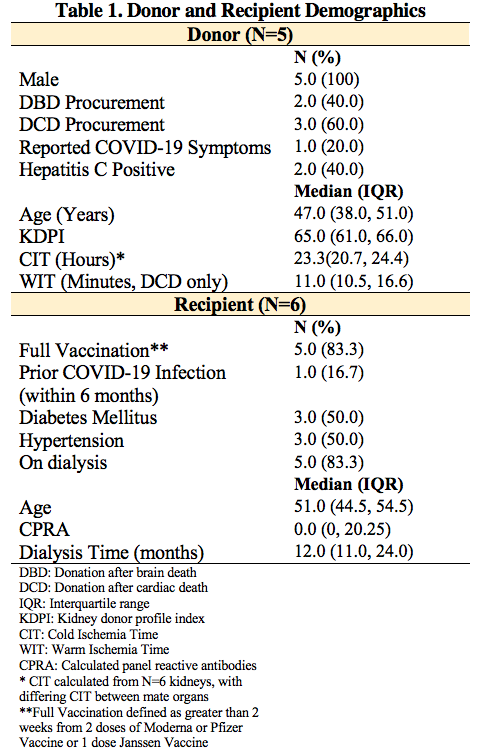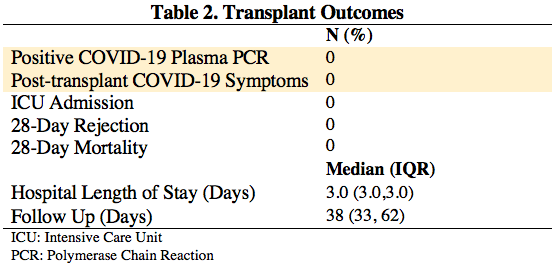Undetectable recipient COVID-19 plasma PCR following COVID-19 positive donor kidney transplant: proof of concept analysis
Hailey Hardgrave1, Joe Nigh2, Sushma Bhusal3, Lyle Burdine 4, Raj Patel 4, Emmanouil Giorgakis 4.
1College of Medicine, University of Arkansas for Medical Sciences , Little Rock, AR, United States; 2Department of Surgery, University of Arkansas for Medical Sciences , Little Rock, AR, United States; 3Division of Nephrology, University of Arkansas for Medical Sciences , Little Rock, AR, United States; 4Division of Solid Organ Transplantation, University of Arkansas for Medical Sciences , Little Rock, AR, United States
Introduction: With one-third of the United States still not fully vaccinated for COVID-19 and almost one-half unvaccinated in Arkansas, it is common to see patients presenting with non-survivable diagnosis, incidentally testing COVID-19+ or with recent history of mild COVID-19 infection. In the absence of COVID-19, such patients could become organ donors. Limited case series have demonstrated no COVID-19 syndrome following transplantation from such donors. However, hematogenous asymptomatic transmission of the COVID-19 virus following transplant remains unclear. Aim of this study was to assess COVID-19 virus presence in the recipient’s bloodstream at the early post-transplant period following COVID-19+ organ transplantation.
Methods: An institutional protocol was drafted for the use of COVID-19+ donor organs. Eligible donors included those test COVID-19+, however with cause of death not related to COVID-19, and no evidence of moderate to severe COVID-19. Eligible recipients included those who tested negative for COVID-19 at the time of transplant, had been fully vaccinated against COVID-19, and consented to receive such organs. A protocol deviation occurred when a COVID-19+ organ was transplanted into a non-vaccinated recipient with recent history of resolved COVID-19 infection. Plasma was drawn to test for COVID-19 polymerase chain reaction (PCR) prior to hospital discharge post-transplant. All recipients received tixagevimab-cilgavimab (Evusheld) after plasma COVID-19 PCR testing.
Results: Six recipients underwent kidney transplantation from COVID-19+ donors. One donor had reported mild symptoms of COVID-19 prior to hospitalization. Two donors tested Hepatitis C positive by nucleic amplification testing. 83.3% (N=5) of recipients were fully vaccinated prior to transplant (Table 1). An additional recipient had not been vaccinated but had history of recent COVID-19 infection. None of the recipients developed COVID-19 symptoms post-transplant. All had undetectable serum plasma COVID-19 PCR prior to discharge (testing range post-operative day 2 to 5). Post-transplant median length of stay was 3 days. Median follow-up was 39 days (33, 62). Two recipients had delayed renal allograft function. One patient developed antibody-mediated rejection diagnosed on post-operative day 30. No recipients required post-transplant testing for suspected COVID-19 symptoms. There was no mortality (Table 2).
Discussion: This case series provides proof of concept that there is no evidence of hematogenous transfer of COVID-19 from donor positive organs to recipients immune to the virus. Therefore, otherwise transplantable organs from donors incidentally diagnosed with COVID-19 at the time of donation, with no indication of severe COVID-19 disease at the time of donation, should be considered for non-thoracic organ transplantation to suitable recipients, after appropriate consenting.


